How Our Perceptions of Time and Money Change as We Age
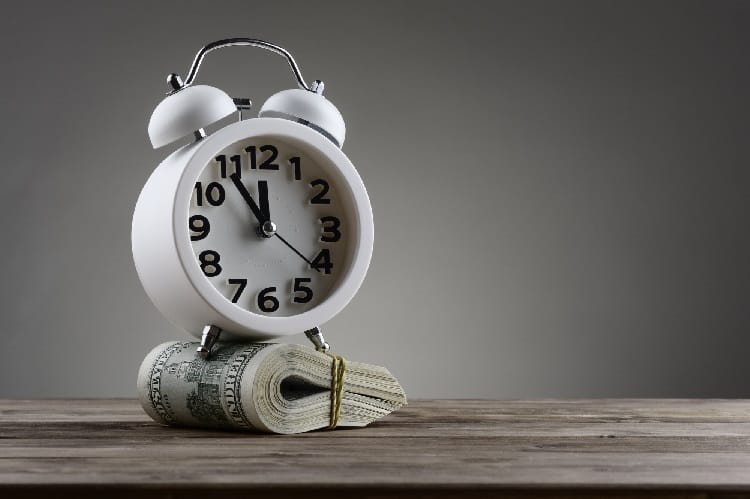
Our perceptions of the value of time and money shift as we age.
In early adulthood, time is abundant, while money is scarcer. We want more money and are willing to sacrifice our time to get it.
By middle age, a thriving career helps us earn more, but job and family obligations consume our time. Life is expensive, and working middle-aged people never seem to have enough time or money.
Approaching retirement, we’re more willing to spend money to save time. Why mow the lawn when you could be playing golf or Bridge? And what good is all that wealth if we have no time to enjoy it?
Time was valuable all along.
But as we age and grow wealth, we learn to appreciate time more because we have less of it to live.
The sooner we learn, the sooner we can shift our focus to what’s most important.
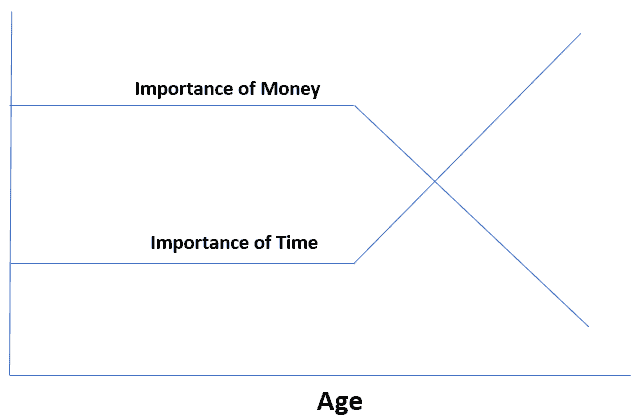
The crossover point — when we fully embrace time as the superior resource and prioritize accordingly — is realized at different stages of life for different people.
It may be gradual or sudden.
The approach to retirement is a typical time when priorities shift.
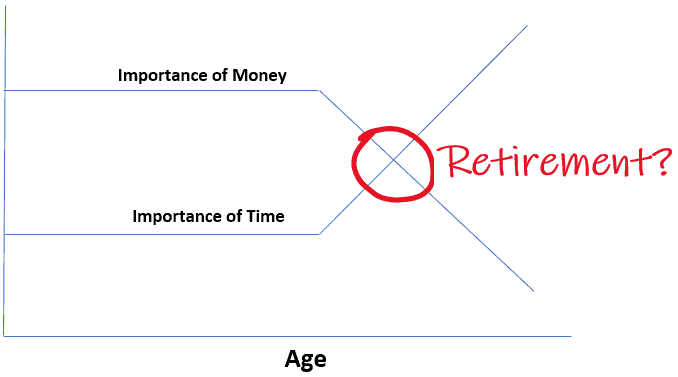
The standard path of attaining an expensive education and then working full-time for the next four decades to retire at 65 is still predominant.
But that’s Baby Boomer gold-watch thinking.
We have more options.
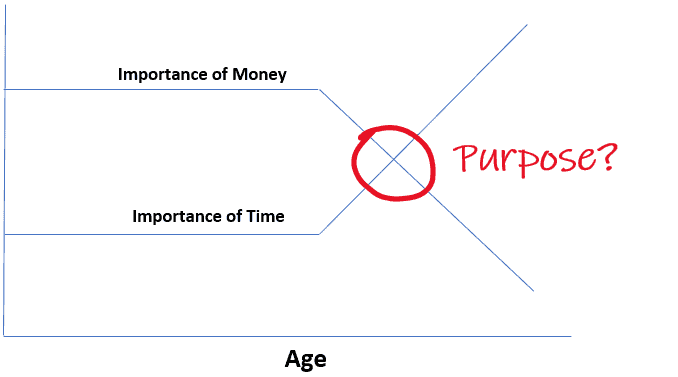
Maybe when we find our true purpose in life, we modify priorities to elevate the importance of time, relationships, and our impact on the world over income and wealth.
For those with a clearly defined purpose, time spent not fulfilling that purpose is wasted time.
There can be prosperity in purpose. Finding work you love that serves others and makes you wealthy might be the holy grail.
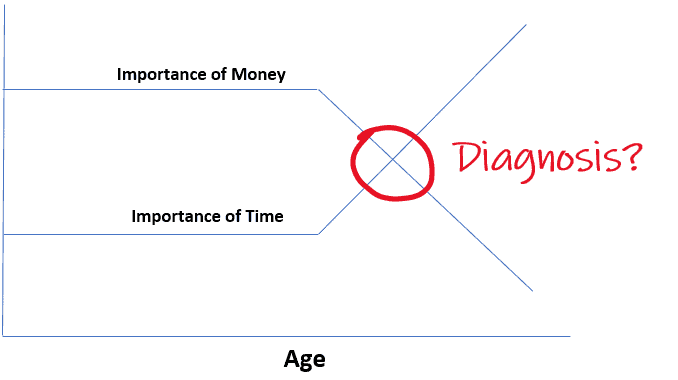
A serious health diagnosis, accident, or death of a loved one might change your feelings about time and money too.
Imagine a doctor telling you there are only a few months left to live.
Life’s priorities would shift immediately.
My son’s Type 1 Diabetes diagnosis is manageable, but it made me rethink many aspects of my life, especially how I spend my weekdays.
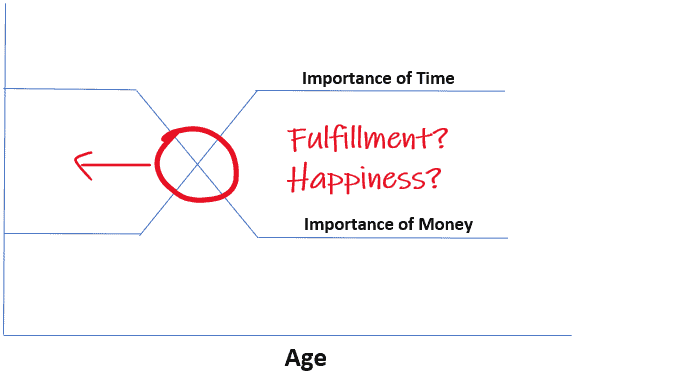
Maybe reaching the crossover point sooner can lead to greater happiness and long-term fulfillment.
Money remains essential as we age — it gives us financial security, flexibility, and options.
And time is key to growing wealth — hold onto the money you earn and invest and let compound interest do its thing.
But if the pursuit of more money is all-consuming and unending, we might be underprioritizing the good stuff.
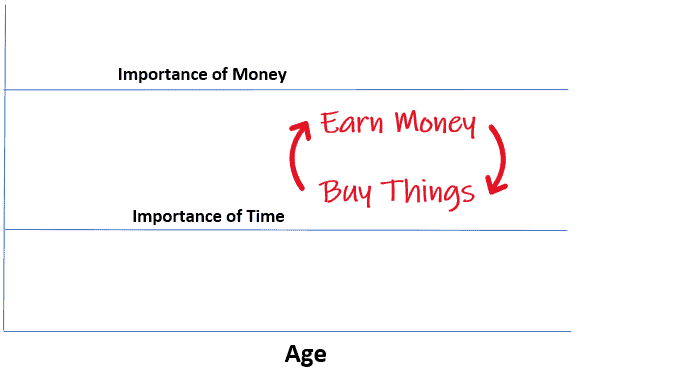
The earn and spend trap might make retirement unthinkable for some.
As people grow their income, they tend to increase spending at the same pace.
Personal finance writers call this lifestyle inflation.
Instead of saving the delta in annual earnings after a big raise, the extra money evaporates. Nicer cars, exclusive memberships, jewelry, private school, and expensive hobbies siphon money from our bank account into an abyss.
Or sometimes, it’s just lazy budgeting and overspending on food.
In wealth building, it’s not what you earn but what you save.
When people prioritize material things or status purchases over saving, their active income must persist to fuel the continuous cycle.
This keeps high earners in the workplace longer, still wearing suits five days a week into their 70s.
I can’t imagine.
To break the cycle, they either need a massive savings pool, or they’ve got to stop the lifestyle-embedded spending.
Not easy.
Rarely, older full-time workers aren’t in it for the money.
I admire people who work a job or career they genuinely love and never want to retire — those who prioritize craft, progress, continual learning, and self-improvement — and still enjoy the satisfaction of a paycheck or profit statement.
Those people are uncommon, especially in my profession (IT consulting). Nearly every coworker I’ve spoken to about retirement can’t wait to get there.
Yet they fear they cannot because they haven’t saved enough to cover their obligations and desired lifestyle.
The upside to falling into a career I didn’t love in my early 20s was that I was motivated to save aggressively to retire from it.
I’ve swapped enough time for enough money, making me less inclined to keep tolerating that trade-off.
Featured photo via DepositPhotos used under license.

Craig is a former IT professional who left his 19-year career to be a full-time finance writer. A DIY investor since 1995, he started Retire Before Dad in 2013 as a creative outlet to share his investment portfolios. Craig studied Finance at Michigan State University and lives in Northern Virginia with his wife and three children. Read more.
Favorite tools and investment services right now:
Sure Dividend — A reliable stock newsletter for DIY retirement investors. (review)
Fundrise — Simple real estate and venture capital investing for as little as $10. (review)
NewRetirement — Spreadsheets are insufficient. Get serious about planning for retirement. (review)
M1 Finance — A top online broker for long-term investors and dividend reinvestment. (review)

RBD, as usual, right on point. You were my inspiration for dividend stock investing several years ago. Today I jumped into Fundrise. Thanks for the push!
Thanks Nancy. Inspiration? I’m blushing 🙂
RBD, you’re spot on! Interesting how we seem to recognize the importance of time more as we age. I wrote “Time Affluence” shortly after I retired, and the concept was the perfectly aligned with what you’ve outlined in this post. You, however, included much more catchy graphics. Love those charts!!
Thanks for adding your wisdom, Fritz. You have the better title. Here’s that article you referenced:
https://www.theretirementmanifesto.com/time-affluence/
Good stuff! Everything has its trade offs, right?
Thanks to a new work-from-home arrangement, I feel that much closer to retirement. (It doesn’t hurt that my new role is less intense than previous ones.)
With the kids still in school for another 9 years and my younger wife still wanting to work for as many, I am okay to keep pressing on. At least, until I figure out what purposeful routines can occupy my time after retirement.
Enjoyed the article. As I approach my mid 50’s in the corporate world I have found myself enjoying my “PTO” much more. After just taking 2 weeks off in a row ( first time in my corporate career),I was not “ready” to return. I spent some of my idol time reading some of your older articles and even read Fritz Gilbert’s keys to a successful retirement. I appreciate your knowledge and you sharing as we all go along in this life’s journey.
Thanks for reading, Michael. Hard to believe you’ve only taken on 2-week vacation your entire career. I’ve never skimped on my PTO over my career. The most I took was 3 weeks for my honeymoon. But it’s usually one week at a time. I just took of 6 business days and my customer said “seemed like you were gone forever”. Made me want to be gone forever.